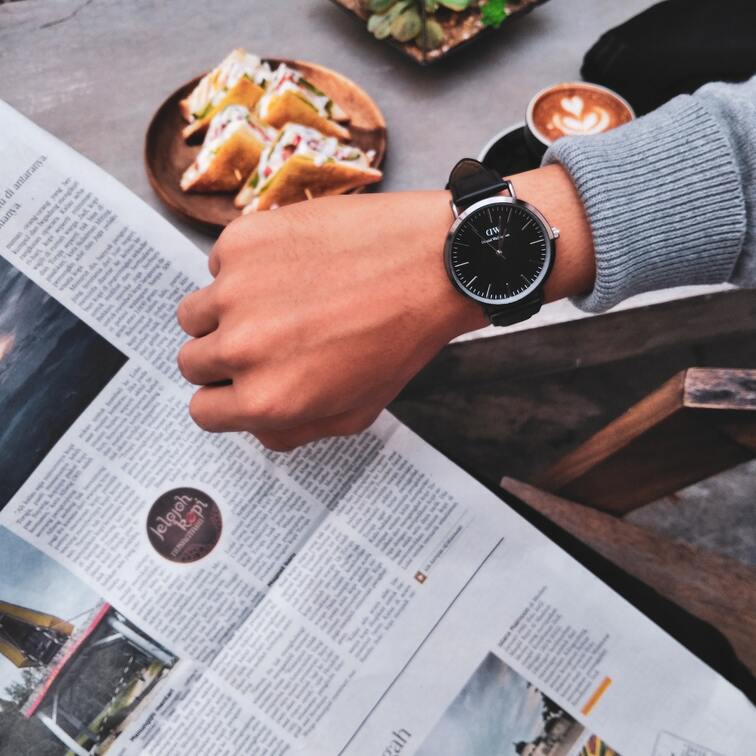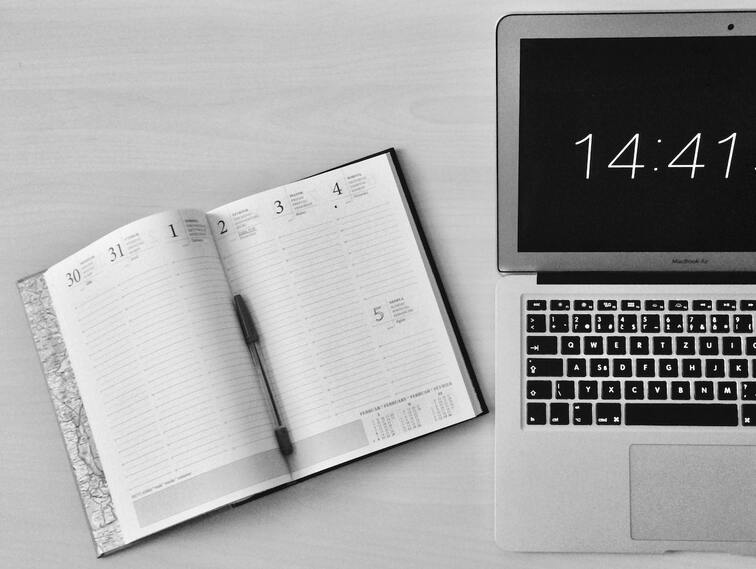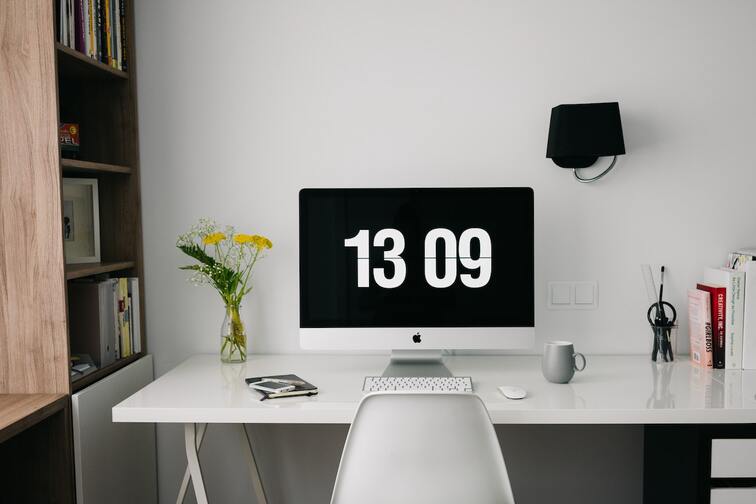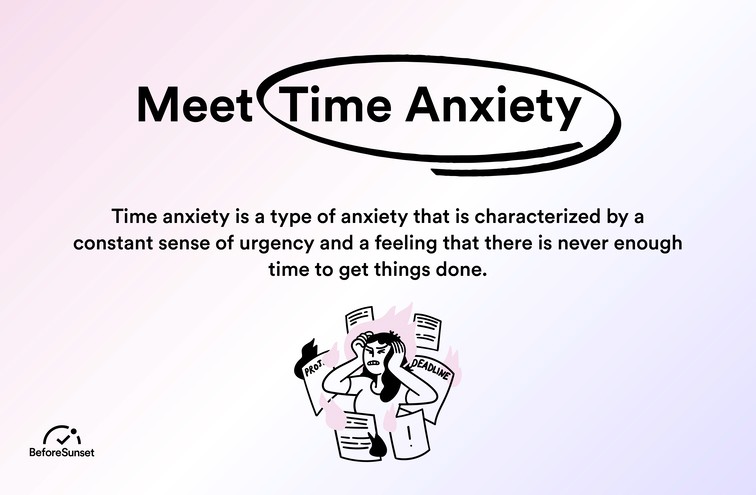Time anxiety is a common problem that many people struggle with. It manifests in different ways, such as feeling overwhelmed by deadlines, stressing about how much time we have to get things done, or constantly feeling like we are running out of time.
Time anxiety can be especially problematic when it interferes with our ability to enjoy our daily lives or meet our personal and professional goals. In this blog post, we will explore the causes of time anxiety, the symptoms it can produce, and strategies for coping with it.

What is Time Anxiety?
Time anxiety is a type of anxiety that is characterized by a constant sense of urgency and a feeling that there is never enough time to get things done. It is a common problem that many people struggle with and can manifest in different ways, such as feeling overwhelmed by deadlines or constantly feeling like you are running out of time.
Time anxiety can be especially problematic when it interferes with your ability to enjoy your daily life or meet your personal and professional goals. It can lead to feelings of overwhelm, stress, and even depression if left unchecked.
How does time anxiety manifests in people's lives?
Time anxiety can manifest in different ways in people's lives. Some common ways it can manifest include feeling overwhelmed by deadlines, constantly feeling like you are running out of time, and worrying about how you will get everything done. It can also lead to feelings of stress and overwhelm, as well as physical symptoms such as stomachaches, headaches, and difficulty sleeping.
Time anxiety can interfere with your ability to enjoy your daily life and meet your personal and professional goals, and if left unchecked, it can lead to feelings of depression. It is important to address time anxiety and find ways to manage it in order to improve your overall well-being and quality of life.

What Causes Time Anxiety?
There are various factors that can contribute to time anxiety. Some common causes of time anxiety include:
External pressures
Work deadlines, family responsibilities, and other external demands can put a strain on our time and cause us to feel anxious.
Internal factors
Perfectionism, procrastination, and other internal factors can contribute to our experience of time anxiety.
Lack of control
Feeling like we don't have control over our time or our schedule can lead to feelings of anxiety.
Unclear goals
If we don't have clear goals or a sense of direction, we may feel like we are wasting our time and become anxious about it. Or maybe you're feeling rushed when you go to visit your family or friends, but this could actually be because they don't understand your needs as someone with panic disorder.
You might have been trying to tell them that things are different now than they used to be, but they haven't realized how much more limited your energy levels are since having panic attacks in public.
Past experiences
Past experiences, such as missed deadlines or failing to meet expectations, can contribute to our feelings of anxiety about time. It's common to experience time anxiety around life milestones, such as graduating from school, starting a new job, getting married, or having children. These events can bring up feelings of pressure and uncertainty about the future. It can be helpful to remember that it's okay to take your time and not rush through life milestones.
It's important to take care of yourself and make sure you are ready for the next step before moving forward.
Overcommitting
Taking on too many tasks or commitments can lead to feelings of overwhelm and anxiety about how we will manage our time.

What Are the Symptoms of Time Anxiety?
Time anxiety can produce a range of physical and emotional symptoms. Some common symptoms of time anxiety include:
Racing thoughts
Constant worry about how much time we have and how we will get everything done can lead to racing thoughts and difficulty focusing.
Difficulty sleeping
Worrying about time can interfere with our sleep and lead to insomnia or other sleep problems.
Difficulty relaxing
Time anxiety can make it difficult to relax and enjoy leisure activities.
Feelings of overwhelm
Constantly feeling like there is not enough time can lead to feelings of overwhelm and stress. Irritability Time anxiety can lead to irritability and difficulty managing our emotions.
Chronophobia
What if you're a person who's constantly rushing and feeling like there's not enough time? If this sounds familiar, you might be suffering from a phobia called chronophobia—and you can learn how to manage it.
Chronophobia is a fear of time and its passing. It's similar to other phobias that we've all heard of—like arachnophobia (fear of spiders), acrophobia (fear of heights), or claustrophobia (fear of closed spaces).
People with chronophobia tend to feel anxious when they're pressed for time or have too much on their plate at home or work. They might feel like they're always running late, which leads them to miss deadlines or appointments. Chronophobics also tend to feel rushed when they have plans with friends and family members, which can make them unable to relax and enjoy the experience of spending time together.
Like most phobias, chronophobia has both psychological and physiological components—it can cause physical symptoms like nausea and rapid heartbeat when someone
Physical symptoms
Time anxiety can produce physical symptoms such as stomachaches, headaches, and difficulty breathing.
It's important to note that these symptoms can vary in severity and may not all be present in every person with time anxiety. If you are experiencing any of these symptoms, it may be helpful to seek support from friends, family, or a therapist to help you cope.
How to Win Over Time Anxiety?
There are a number of strategies that can be helpful in getting rid of time anxiety.
Setting boundaries
Setting boundaries around your time and saying no to certain commitments can help you prioritize your tasks and reduce feelings of overwhelm.
Prioritize your tasks
Make a list of your tasks and prioritize them based on importance and deadline. This can help you feel more in control of your time.
Practice mindfulness
Taking breaks to focus on the present moment and engaging in activities such as meditation or yoga can help calm your racing thoughts and reduce feelings of anxiety.
Seek support
Talk to friends, family, or a therapist about your time anxiety. They can offer support and help you develop strategies for coping with your anxiety.
Take care of your physical and mental health
Make sure to get enough sleep, eat well, and engage in regular physical activity, as these can all help reduce feelings of anxiety.
It's important to find the coping strategies that work best for you and to be patient with yourself as you work on managing your time anxiety. It may take some trial and error to find what works best for you, but with practice and support, you can learn to manage your time anxiety and live a more peaceful, fulfilling life.
Learn time management skills
There are many resources available to help you develop time management skills, such as books, websites, and workshops. These can be helpful in reducing feelings of anxiety about time.

In conclusion, time anxiety is a common problem that many people struggle with. It is characterized by a constant sense of urgency and a feeling that there is never enough time to get things done.
Fortunately, there are a number of strategies that can be helpful in coping with time anxiety, including setting boundaries, prioritizing tasks, practicing mindfulness, seeking support, learning time management skills, and taking care of your physical and mental health.
If you are struggling with time anxiety, remember that you are not alone. Don't hesitate to reach out for support from friends, family, or a therapist.
There are also many resources available, such as books, websites, and workshops, that can help you learn strategies for managing your time anxiety. With the right tools and support, you can learn to manage your time anxiety and live a more peaceful, fulfilling life.
Thank you for reading this blog post on time anxiety. If you found it helpful, please consider sharing it with others who may also be struggling with time anxiety. Together, we can spread awareness and support those who are seeking help in managing their anxiety. If you or someone you know is struggling with time anxiety and would like more information or support, please don't hesitate to reach out.
Dealing With Time Anxiety
How can I limit distractions to help reduce time anxiety?
Limiting distractions can be an effective way to help reduce time anxiety. Here are some strategies that may be helpful: Start by turning your notifications off. Consider turning off notifications for email, social media, and other apps that may be distracting. You can also set specific times to check your messages rather than responding immediately.
Then create a designated workspace. If possible, try to create a designated workspace that is free from distractions such as television or loud music. This can help you stay focused and get more done.
Continue with setting limits on social media and other leisure activities. It can be easy to get lost in social media or other leisure activities, so consider setting limits on how much time you allow yourself to spend on these activities.
After setting limits on social media and other leisure activities, use tools to block distracting websites. There are tools available that can block distracting websites for a set amount of time, which can be helpful in reducing distractions.
Lastly don’t forget to communicate with others. If you have a partner or family members who may be causing distractions, it can be helpful to communicate with them about your need for focus and set boundaries around your work time.
Remember, it's important to be patient with yourself and to find the strategies that work best for you. With practice and time, you can learn to limit distractions and reduce time anxiety.
What can I do to help reduce time anxiety?
Practicing yoga and meditation can definitely be helpful in reducing time anxiety. Yoga is a physical and mental practice that involves various poses, breathing techniques, and meditation. It can help reduce stress and anxiety by calming the mind and promoting relaxation. Similarly, meditation is a practice that involves focusing the mind on a particular object, thought, or activity to train attention and awareness.
It can help reduce stress and anxiety by helping you find a sense of inner peace and clarity. Both yoga and meditation can be incorporated into your daily routine and can be practiced in a class setting or on your own at home.

Can BeforeSunset AI help me with time anxiety?
Of course, it can. Tracking your time with BeforeSunset can be helpful for managing time anxiety because it allows you to see how you are spending your time, identify any areas where you may be wasting time, and set goals for how you want to use your time in the future. This can help you to feel more in control of your time and reduce feelings of overwhelm and anxious.
You can use your time-tracking data to set achievable goals for the future. This can help you to feel more in control of your time and reduce feelings of anxiety about the future.
Take control of your time with BeforeSunset.

